Hey there, fellow home chefs and curious readers! Today, we’re diving into the world of gas cooktops and all those little tales we hear about them. Let’s debunk some myths and confirm some truths, shall we?
First off, have you ever heard someone say that gas cooktops aren’t environmentally friendly? Well, hold onto your chef hats, because this isn’t entirely true!
Sure, they use fossil fuels, but modern gas cooktops are designed to be super efficient. This means they use less gas to cook your food, which is better for both the planet and your energy costs.
I remember when my grandma used to cook on her old gas stove – she’d say, “Speedy cooking for speedy eaters!” And guess what? She was right! Gas cooktops do heat up faster, making your cooking speed zoom!
Now, let’s chat about safety concerns. Some folks think gas cooktops are like having a dragon in the kitchen. But with a bit of know-how and care, they’re as safe as any other appliance.
Just remember to turn off the knobs properly (no mini fireworks, please!), and you’re good to go. The heat control you get with gas is top-notch – perfect for those secret family recipes requiring just the right touch.
Lastly, I’ve got to spill the beans about cleaning. Some say cleaning gas cooktops is a battle against grease and grime. Well, it’s not exactly a walk in the park, but it’s not as hard as finding a unicorn either.
Most models now come with easy-to-clean surfaces and removable parts. So, with a little elbow grease, your cooktop can sparkle like a star!
Gas cooktops are like those mystery books you can’t put down – full of surprises but totally worth exploring. Whether it’s managing your energy costs, enjoying speedy cooking, or just loving that precise heat control, these cooktops have some serious perks. Just remember to handle them with care, and you’ll be flipping pancakes like a pro in no time!
Myth 1: Gas Cooktops Are More Powerful and Heat Up Faster than Electric Cooktops
One common myth surrounding gas cooktops is that they are more powerful and heat up faster than electric cooktops. While it is true that some gas cooktops have higher BTU ratings than electric cooktops, this doesn’t necessarily mean they are faster or more powerful.
Modern electric cooktops, especially induction models, can heat up just as quickly as gas cooktops. In fact, induction cooktops are capable of providing instant and precise temperature control that rivals or exceeds most gas cooktops.
| Gas Cooktops | Electric Cooktops | Induction Models | |
|---|---|---|---|
| Btu Ratings | May have higher ratings | N/A | N/A |
| Heat Up Speed | Varies depending on BTU ratings | Can heat up quickly, especially induction models | Provides instant heat |
| Precise Temperature Control | May require manual adjustments | Can offer precise temperature control | Provides precise temperature control instantly |
So, while gas cooktops may have their advantages, it is important to know that electric cooktops, especially induction models, can offer similar results when it comes to speed and precise temperature control.
Myth 2: Gas Cooktops Offer More Even Heating than Electric Cooktops
Another common misconception is that gas cooktops provide more even heating compared to electric cooktops.
However, modern electric cooktops, particularly induction models, distribute heat exceptionally evenly t ough the cookware, eliminating hot spots and ensuring consistent cooking.
This is because induction models use magnetic fields to directly heat the cooking vessel, rather than the air around it like gas cooktops.
To illustrate this point, consider the following comparison table:
| Gas Cooktops | Electric Cooktops | Induction Cooktops | |
|---|---|---|---|
| Heating Method | Open Flame | Electric Element | Magnetic Fields |
| Heating Speed | Fast | Fast | Fast |
| Heat Distribution | Uneven | Even | Exceptionally Even |
| Energy Efficiency | Less Efficient | More Efficient | More Efficient |
As you can see, while gas cooktops may heat up quickly, they fall short in terms of heat distribution and energy efficiency compared to electric cooktops, especially induction models.
For those who prioritize consistent cooking and want to avoid the frustration of hot spots and uneven temperatures, an electric cooktop, particularly an induction model, is the way to go.
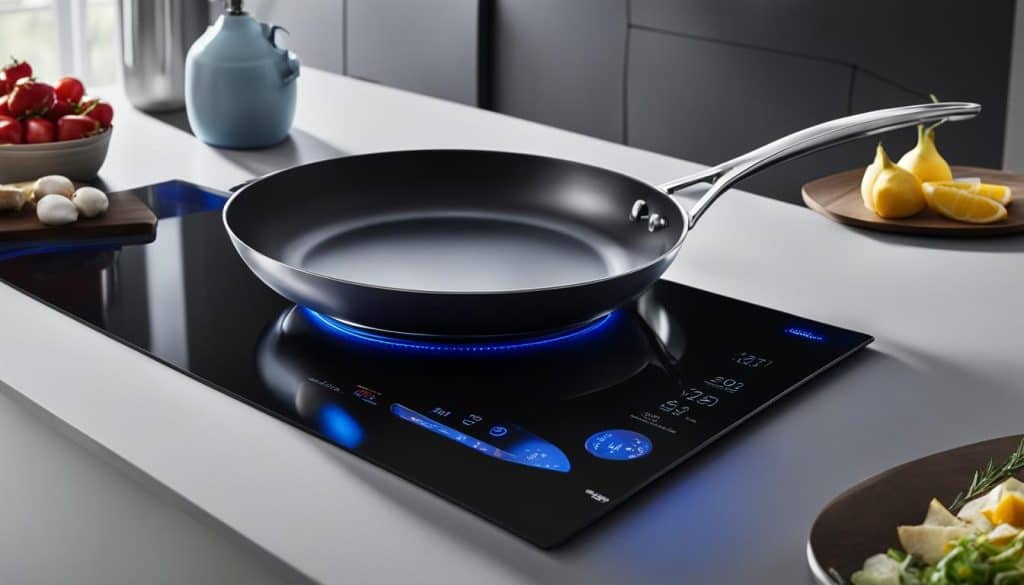
Myth 3: Gas Cooktops Are More Responsive and Offer Better Control Over Cooking Temperature
It is common knowledge that gas cooktops offer quick temperature changes and precise cooking. However, induction cooktops have proven to be just as responsive and have numerous advantages over gas cooktops.
Induction cooktops use electromagnetic induction to transfer heat directly to the cookware, making them highly responsive to temperature changes.
They offer instant temperature control and can maintain a consistent temperature t oughout the cooking process. This ensures quick adjustments and consistent results that often exceed the responsiveness of most gas cooktops.
| Gas Cooktops | Induction cooktops | |
|---|---|---|
| Instant Temperature Control | No | Yes |
| Quick Adjustments | Yes | Yes |
| Consistent Results | No | Yes |
As you can see from the table above, induction cooktops deliver instant temperature control, quick adjustments, and consistent results, making them a better choice for any chef looking for advanced cooking technology.
Additionally, induction cooktops are safer than gas cooktops because they only heat the cookware, leaving the surface cool to the touch. Unlike gas cooktops, there is no open flame or gas leakage risk.
Myth 4: Cooking with Gas Is Superior for Achieving a Smoky Flavor
Many individuals believe that cooking with gas results in a smoky flavor in dishes, leading them to prefer gas cooktops over electric ones. However, this is not entirely true. While gas cooktops can impart a subtle smoky flavor, the taste difference is often negligible.
It’s essential to note that many electric cooktops nowadays offer features like built-in grills or smoke infusers that can achieve similar results. These built-in grills and smoke infusers help infuse a smoky flavor into your dishes, making them just as delicious as those cooked on gas cooktops.

I’ve always been a fan of gas cooktops for the unique smoky flavor it gives my dishes. But after trying out a new electric cooktop with a built-in grill, I was amazed at how similar the flavor was to my gas cooktop.
If you’re worried about missing out on that signature smoky flavor, don’t be! Electric cooktops featuring built-in grills or smoke infusers can be a great alternative to gas cooktops.
Myth 5: Gas Cooktops Are More Difficult to Clean than Electric Cooktops
While some may assume that gas cooktops are harder to clean than electric cooktops, it’s not entirely true. One of the benefits of smooth electric cooktops is that cleaning spills and splatters is often a breeze.
However, when it comes to gas cooktops, cleaning around the grates and burner caps may require a bit more elbow grease.
That said, it is essential to note that gas cooktops may require regular cleaning to prevent grease buildup and potential fire hazards. Therefore, keeping your gas cooktop clean is key to ensuring its longevity and safe operation.
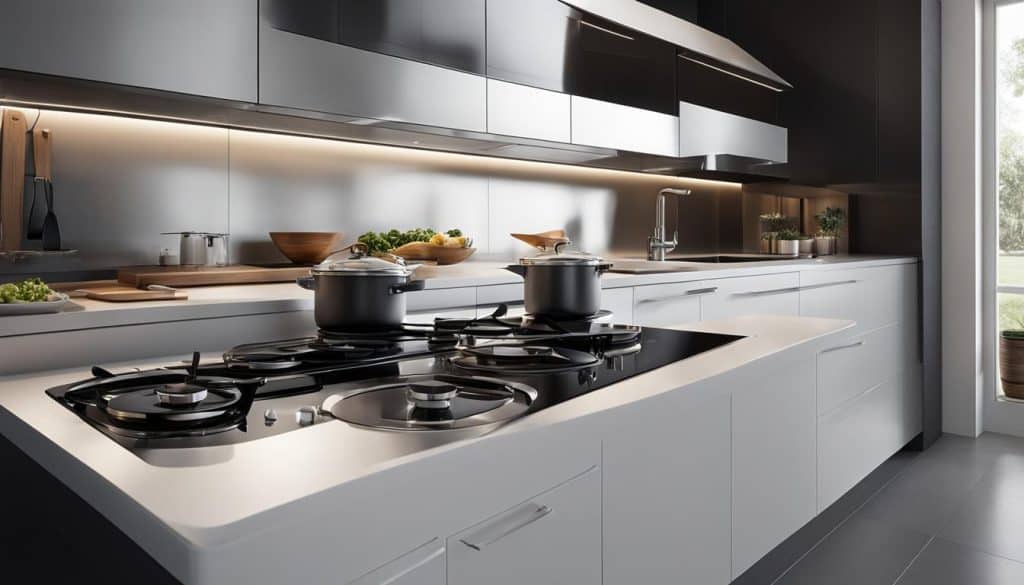
“Cleaning around the grates and burner caps may require a bit more elbow grease.”
Myth 6: Gas Leaks Are a Common and Dangerous Occurrence with Gas Cooktops
When it comes to gas cooktops, safety is a top concern. One common myth is that gas leaks are a common and dangerous occurrence with gas cooktops. As someone who has extensively researched this topic, I can assure you that this is not entirely true.
Modern gas cooktops are equipped with safety features that automatically shut off the gas supply if a leak is detected. These features include a flame failure device that detects if the flame has gone out and cuts the gas supply.
Most gas cooktops come with electronic ignition, eliminating the need for a standing pilot light that could be a potential source of gas leaks.
While gas leaks can occur, they are typically rare and often a result of improper installation or maintenance. It’s crucial to have your gas cooktop installed by a professional and to have it regularly inspected and maintained to ensure safe operation.
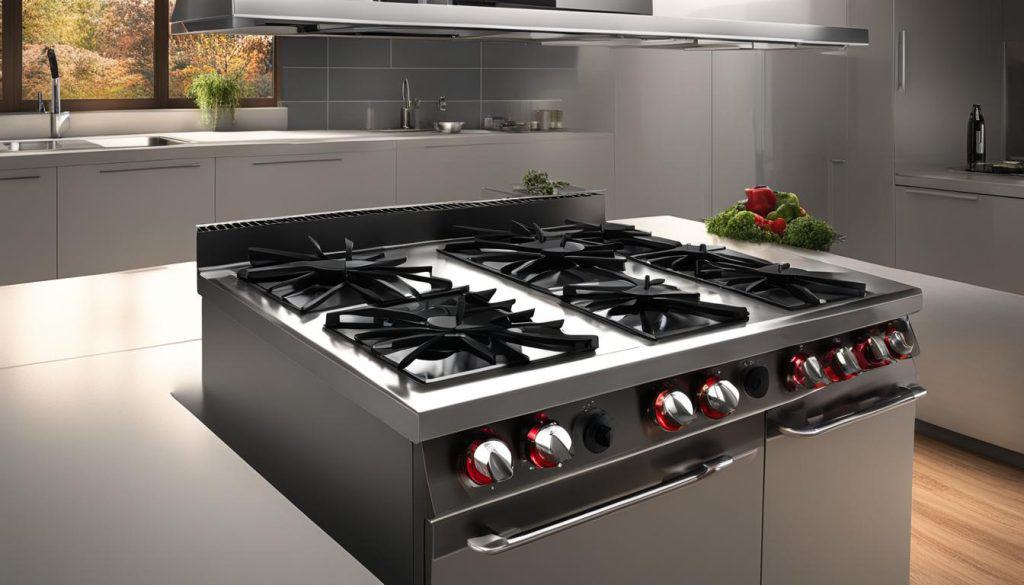
In conclusion, gas leaks should not be a major concern when it comes to using a gas cooktop. With proper installation and regular maintenance, gas cooktops can be a safe and reliable option for your kitchen.
Myth 7: Gas Cooktops Are More Environmentally Friendly than Electric Cooktops
There is a common misconception that gas cooktops are more environmentally friendly compared to electric cooktops. While it is true that natural gas is a domestic resource and burns cleaner than coal, it still releases harmful emissions such as carbon monoxide and nitrogen oxides into the atmosphere.
On the other hand, electric cooktops can be powered by renewable energy sources such as solar and wind power, making them a more sustainable option for environmentally conscious consumers.
Electric cooktops can minimize waste by only using the energy necessary to heat the cookware, whereas gas cooktops waste energy by heating the surrounding air as well.
“While gas cooktops may be more efficient in terms of time and convenience, electric cooktops are undoubtedly the better option for those looking to reduce their carbon footprint.”
If you’re looking to minimize your impact on the environment, consider investing in an electric cooktop powered by renewable energy sources. This choice not only benefits the planet but also saves you money in the long run as utility companies incentivize the use of renewable energy sources.

Myth 9: Gas Cooktops Are More Affordable than Electric Cooktops
When it comes to the cost of gas cooktops versus electric cooktops, there are a few factors to consider beyond just the initial price tag. While it’s true that some gas cooktops may have a lower upfront cost compared to electric models, the cost of installation and ongoing gas bills can add up over time.
Professional installation is necessary for gas cooktops, and this can be a significant expense. In addition, ongoing gas bills can be much higher than electricity costs in some areas, especially if you do a lot of cooking.
On the other hand, electric cooktops are generally easier and less expensive to install. They also tend to be more energy-efficient and can save you money in the long run on your electricity bills.
When considering the affordability of gas versus electric cooktops, it’s important to take into account both the initial cost and the ongoing expenses associated with each option.
Gas Cooktops vs. Electric Cooktops: A Cost Comparison
To provide a clearer picture of the cost differences between gas and electric cooktops, take a look at the chart below:
| Expense Type | Gas Cooktops | Electric Cooktops |
|---|---|---|
| Initial Cost | $500-$1,500 | $600-$1,800 |
| Installation | $500-$1,000+ | $0-$200 |
| Ongoing Fuel Costs | $12-$20/month | $8-$12/month |
| Ongoing Maintenance Costs | $50-$100/year | $0 |
As you can see, while gas cooktops may have a lower initial cost, the installation and ongoing fuel costs can quickly add up, making electric cooktops a more cost-effective option in many cases.
Ultimately, the choice between a gas or electric cooktop will depend on your individual needs and budget. By weighing the pros and cons of each option and taking into account the total cost of ownership, you can make an informed decision that best suits your lifestyle and cooking habits.
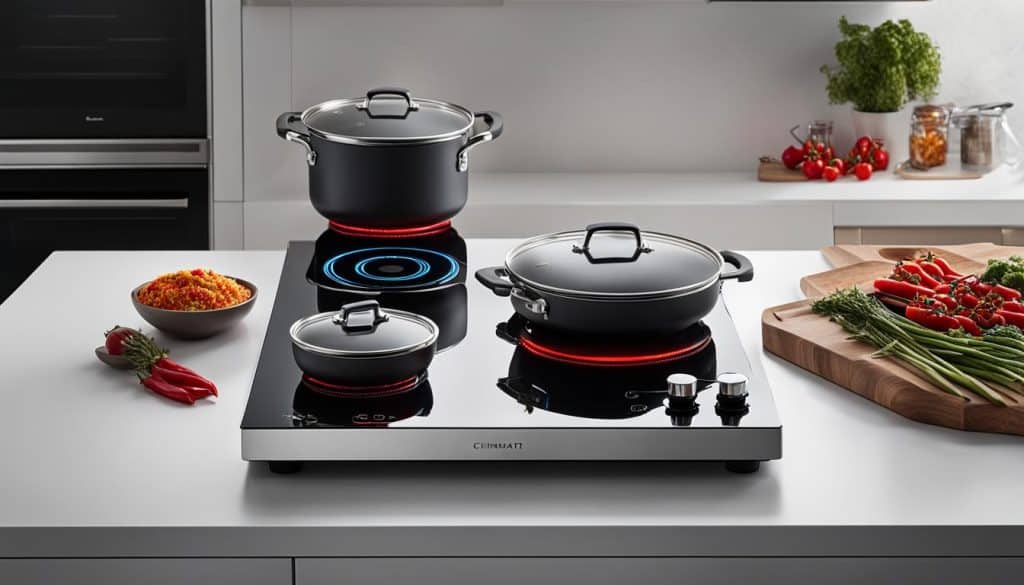
Myth 10: Gas Cooktops Are Essential for Serious Chefs and Professional Kitchens
As a professional chef, I can attest that gas cooktops are not always essential for serious cooking. While gas cooktops have been the industry standard for a long time, electric cooktops have caught up in terms of precision, control, and safety features in recent years.
Many professional kitchens now prefer electric cooktops due to their advantages over gas cooktops.
Electric cooktops allow for more precise temperature control, making it easier to prepare delicate dishes that require specific cooking temperatures. They also come with safety features, such as automatic shut-off, that prevent accidents and potential hazards in the kitchen.
Electric cooktops offer a smooth and flat surface, making them easier to clean and maintain than gas cooktops with their grates and burner caps.
Electric cooktops also offer a wider range of features and functionalities, including induction models that heat up quickly and provide consistent results, making them a popular choice among professional chefs.
These models use electromagnetism to create a magnetic field that heats the cookware directly, rather than the stovetop, resulting in precise and even heating that can surpass gas cooktops.
While gas cooktops may have their merits, they are not always the best choice for serious chefs and professional kitchens. Electric cooktops offer superior precision, control, and safety features, making them a strong contender in the world of high-end cooking.
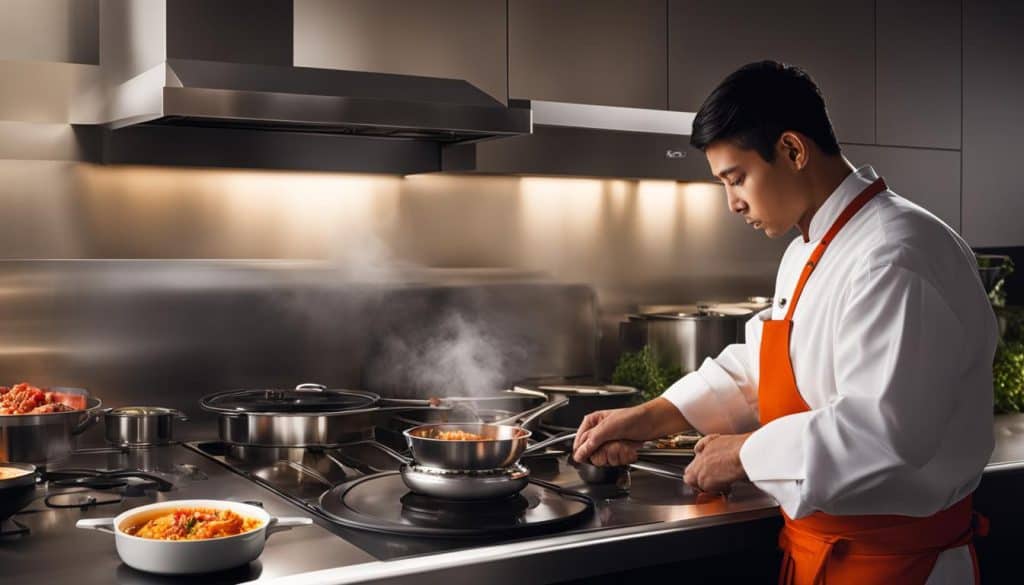
Myth 10: Gas Cooktops Offer a More Authentic Cooking Experience
I used to believe that using a gas cooktop was the only way to achieve an authentic cooking experience. But after trying out modern electric cooktops, I can honestly say that this is not the case.
While gas cooktops do offer a distinct experience, modern electric cooktops have come a long way and offer a wide range of features and functionalities that can make cooking enjoyable and satisfying.
A New Level of Precision
With electric cooktops, you have precise temperature control, allowing you to cook your dishes to perfection.
The heat is distributed evenly, eliminating hot spots and ensuring consistent cooking. This level of precision can be especially beneficial when cooking delicate dishes that require a specific temperature.
Features and Functionalities
Modern electric cooktops come with a variety of features and functionalities that can greatly enhance your cooking experience.
For example, some models have built-in sensors that automatically adjust the temperature and cooking time based on the dish you’re making. Others come with timers, so you don’t have to keep track of cooking times manually.
Safety First
Electric cooktops are also designed with safety in mind. Many models have automatic shut-off features that turn off the heat once the cooking time is up, preventing your food from burning. Additionally, electric cooktops eliminate the risk of gas leaks, making them a safer choice for many households.
When it comes down to it, the cooking experience is subjective and depends on personal preference. While gas cooktops may offer a familiar and distinct cooking experience, modern electric cooktops provide a level of precision, safety features, and functionalities that cannot be ignored.


